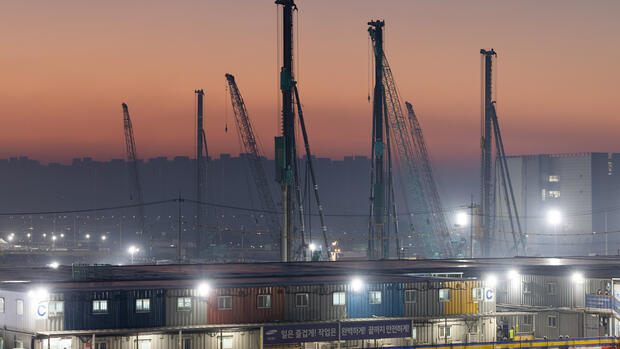Tokyo Even the world market leader in memory chips, Samsung Electronics, is not immune to the slump in chip demand. In the first quarter of this year, the semiconductor division of the largest Korean group slipped into the red for the first time in 14 years. Because the weak demand for electronic products and high inventories have both the demand for memory chips and their prices fall.
In the first quarter of 2023, Samsung posted a loss of 4.56 trillion won (3.1 billion euros) for the group’s previous profit engine. Only the solid profits of the other divisions of the conglomerate, above all the smartphone business, prevented the group from slipping into the red in the first quarter, like the second major Korean memory chip manufacturer SK Hynix.
While Samsung’s revenue fell 18 percent year-on-year to 63.75 trillion won ($47 billion), profit fell 95 percent to 640 billion won ($500 million). Samsung does not expect a significant recovery until the second half of the year, but is not issuing a balance sheet forecast due to the uncertain economic outlook.
Post-pandemic hangover and inventories hit chip industry
Samsung was last in a similarly bad position in 2009 after the global financial crisis. At that time, however, it was the economic shock that caused demand to drop drastically. This time it’s a mix of post-pandemic hangover and weak economy, especially in China.
During the corona lockdown, many people around the world stocked up on electronic items such as computers, televisions and household appliances. Now they prefer to spend their money on travel and other pleasures that have been short-changed during the pandemic. Kim Jaejune, vice president responsible for Samsung’s memory chip business, explained at a conference call with analysts that this will be reinforced by the ongoing economic weakness.
This particularly affects the memory chips, which are also used extensively in data centers, which are currently suffering particularly badly. On the other hand, the high inventories of end devices such as smartphones and computers are declining again. This helps the major Taiwanese contract manufacturers of computer chips such as TSMC and UMC.
>> Read here: Why Germany still has to be patient with TSMC’s decision about a European factory
Although they also lost sales and profits in the first quarter, they remain profitable. But Kim is not yet giving the all-clear. “Demand remains weak because consumer demand has not yet recovered even though China has lifted its corona restrictions,” he said on Thursday.
The result is a triple blow to the chip industry: weak demand, destocking and continued heavy investment in new chip factories. As consumers bought less and companies invested less in data centers and IT equipment, inventories shot up. As long as inventories are not reduced, demand and prices will suffer.
Samsung has reacted and in some cases drastically reduced the production of memory chips. Older products are particularly affected. At the same time, the group does not want to postpone the construction of new factories. Samsung plans to invest about as much this year as it will in 2022 to remain competitive, Vice President Kim said. “The semiconductor business requires continuous investment because it takes a long time for a chip factory to start production.”
Samsung expects a gradual recovery in the second half of the year
Therefore, the company must adapt to future demand. And Samsung continues to rate them as solid, since artificial intelligence and autonomous driving applications, for example, are structurally increasing the demand for data centers and chips.
At the same time, a technological arms race is taking place in the custom manufacturing of chips, which Samsung entered a few years ago. In order to catch up with the market leader TSMC from Taiwan, Samsung is investing massively in technologies with even smaller chip structures.
In 2024, the group wants to start mass production of its second chip generation in three-nanometer technology, in 2025 with the production of two-nanometer chips.
The question is how long the crisis will last. Samsung is not yet expecting a significant recovery in demand for memory chips in the current quarter, as corporate customers are still acting cautiously. The group suspects that the adjustment of inventories will probably continue.
Samsung expects a slight improvement in demand for smartphones and computers. But the group only expects a “gradual recovery” for the second half of the year. On the one hand, stocks will have been reduced by then, and on the other hand, new products could boost consumer demand.
Geopolitics remains a risk factor. According to newspaper reports, the US government is influencing the Korean chip manufacturers to scale back their considerable business with China. Ben Suh, head of investor relations, said the company is in negotiations with the US government and is discussing various scenarios to reduce political risk.
More: The Linux of chip design: A new standard is revolutionizing the semiconductor industry
